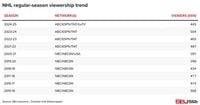The NHL has faced a tumultuous season as the 2025 Stanley Cup Playoffs kicked off on April 19, 2025, bringing with them a wave of disappointment among fans and broadcasters alike. Despite the excitement surrounding the playoffs, national viewership numbers have taken a significant hit, with a reported 12% decline across major networks, including ABC, ESPN, TNT, and truTV. This drop has left many wondering about the future of hockey viewership in the U.S.
According to Austin Karp of Sports Business Journal, NHL games averaged just 445,000 viewers per telecast this season, down from 504,000 last year. This marks the lowest viewership since the final season of the league's media rights deal with NBC Sports during the pandemic-affected 2020-21 season, which saw a dismal average of 391,000 viewers.
The decline in viewership is particularly concerning given that the NHL experienced a boost in popularity earlier this season due to the 4 Nations Face-Off event. When including the viewership from this event, the NHL would actually be up 24% compared to last season. The championship match, featuring Canada against the United States, drew an astounding 9.3 million viewers on ESPN, marking the network's largest hockey audience ever.
However, the excitement generated by the 4 Nations Face-Off has not translated into sustained interest for the playoffs. The NHL's regular season saw significant declines, with ESPN and ABC averaging 584,000 viewers for their 48 games, a 12% decrease from last season's 666,000 viewers. TNT, which has faced its own challenges, reported an even steeper decline of 13%, averaging around 320,000 viewers compared to 360,000 last year.
Adding to the frustration, TNT's decision to broadcast the Stanley Cup Playoffs remotely from a studio in Atlanta has sparked outrage among fans and media experts alike. Critics have pointed out that the remote setup has resulted in weak audio quality and distant camera angles, undermining the atmosphere of the playoff games. Sports analyst Braylon Breeze expressed his discontent on social media, stating, "Stanley Cup Playoffs being called remotely from a studio in Atlanta with odd camera shots is unacceptable."
This move has been interpreted as a cost-cutting measure by the NHL and its broadcasting partners, which has not sat well with fans who expect a more immersive experience during such a crucial time in the hockey calendar. Remote coverage may have been necessary during the height of the COVID-19 pandemic, but many feel it is no longer acceptable for marquee events like the Stanley Cup Playoffs.
Fans have voiced their dissatisfaction across social media, demanding that the NHL and its broadcasters prioritize on-site coverage to restore the excitement and atmosphere that live games typically provide. As the playoffs progress, the pressure is mounting on TNT and other networks to improve their broadcast strategies.
Adding to the complexity of the NHL's viewership challenges is the performance of several high-profile teams this season. The absence of major market teams like the New York Rangers and Boston Bruins from the playoff picture could be contributing to decreased interest among American audiences. Historically, games featuring Canadian teams against American opponents have not drawn as many viewers, a trend that seems to be continuing this season.
Despite these setbacks, there are some bright spots for the NHL. The Red Wings-Blue Jackets game at Ohio Stadium on March 1, 2025, attracted an impressive 1.59 million viewers, marking ESPN's best cable game since reacquiring NHL rights. Additionally, the 4 Nations Face-Off has proven to be a significant success, with ESPN reporting a 33% increase in viewership when including games from this event.
As the NHL looks to the future, industry experts remain cautiously optimistic. Playfly CEO Craig Sloan noted that the big teams that missed the playoffs this season, such as the Rangers and Bruins, are likely to rebound in the coming year. "These are well-resourced teams. A reload in New York and a reload with Boston in particular is expected," he stated. Sloan emphasized that the NHL remains a relevant and attractive audience for marketers, despite current viewership declines.
In conclusion, while the NHL faces significant challenges with declining viewership and criticism over broadcast quality, the league's potential for recovery remains. With the 4 Nations Face-Off demonstrating the ability to draw massive audiences and the hope for a resurgence of popular teams next season, there is still reason to believe that hockey can reclaim its place in the hearts of fans across North America.






